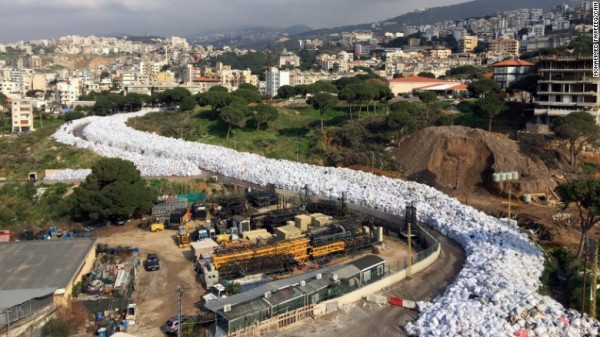
“More than 8,000 tons of accumulated trash have been removed from streets and random dumps in the past 24 hours, which indicates that the waste plan is being implemented in a serious manner,” Environment Minister Mohammed al-Mashnouq announced.
With an estimated 300,000 tons of garbage it will take several weeks o collect all the accumulated garbage
Later on Sunday, a group of young men torched a garbage truck belonging to the Sukleen waste management firm in the Dawhat Aramoun area in protest at the reopening of the Naameh landfill.
In a statement, Sukleen deplored what it described as a “vicious attack,” saying the vehicle sustained damage and the workers were “beaten up as they were performing their duties.”
“These vile attacks will not deter us from carrying out our duty of removing the trash and implementing the plan that was approved by the government,” the firm pledged.
Civil society activists and environmental experts meanwhile lashed out at the government’s plan, warning that it does nothing to allay the ecological concerns that took them to the streets in the first place.
Beirut’s suburbs have been awash in trash for months following the closure in July of the country’s largest landfill at Naameh, just south of the capital.
Rubbish has piled up on beaches and in forests and riverbeds elsewhere in the country.
The government last week said it would reopen the Naameh landfill for two months to ease the crisis, but civil society activists have opposed the plan, demanding a more environmentally sound solution.
Workers could be seen Sunday at Jdeideh, a suburb north of Beirut, using front loaders to pack piles of trash into dozens of trucks.
“The stench is awful but the roads are open, everything is going well on the road, the security forces are facilitating the flow of traffic,” said Kamil Haddad, one of the workers, who wore a protective mask over his nose and mouth.
“Things are going alright,” Haddad said, as his colleagues piled trash into trucks.
Naameh was set up in the early 1990s as a temporary measure. Activists and nearby residents have long opposed the use of the site but when it was shut in July no alternative was proposed.
Two other landfills are also planned for Bourj Hammoud, a mainly Armenian suburb of northern Beirut, and Costa Brava to the south of the capital, likely for four years.
– ‘Back to square one’ –
“The idea of taking the rubbish and dumping it in landfills — this is how the crisis started in the first place. So they (authorities) are basically ignoring the crisis of the past eight months, pretending like nothing happened, and taking us back to square one,” environmental and industrial engineer Ziad Abi Chaker told Agence France-Presse.
He explained that Lebanon could in fact recycle up to 90 percent of its waste.
But “there’s a corruption dimension … There is no huge money to be made out of recycling. The only way to make crazy money is with another corrupt contract,” Abi Chaker said.
“The cherry on the cake is that after the four years, we will have incineration — I don’t know if you can call this a plan, because it certainly has nothing to do with planning.”
Activists from the “You Stink” movement and other groups have also demanded long-term solutions, including investment in recycling and the transfer of waste management duties to municipalities.
The movement has in recent months led a string of protests that has seen thousands of people taking to the streets, accusing the government of mismanagement and corruption, and even calling for its downfall.
“Now the ball is in the court of residents of the areas where the landfills are located,” one leading “You Stink” member told AFP on condition of anonymity, for fear of retribution.
“We do hear some people have started to mobilize in a couple of areas, but when you see the army, security and intelligence forces deployed in the Naameh area — how do you think residents will dare take action?”

Leave a Reply
You must be logged in to post a comment.